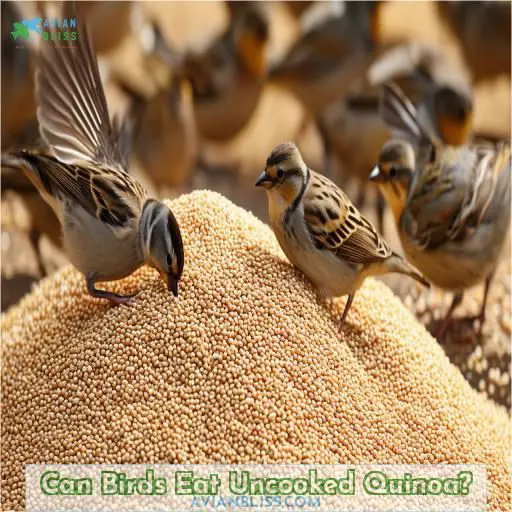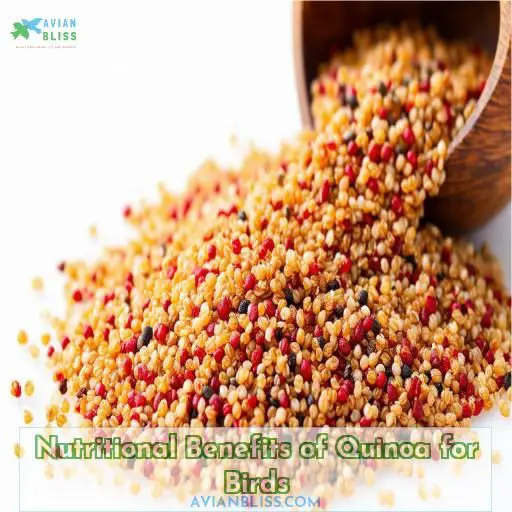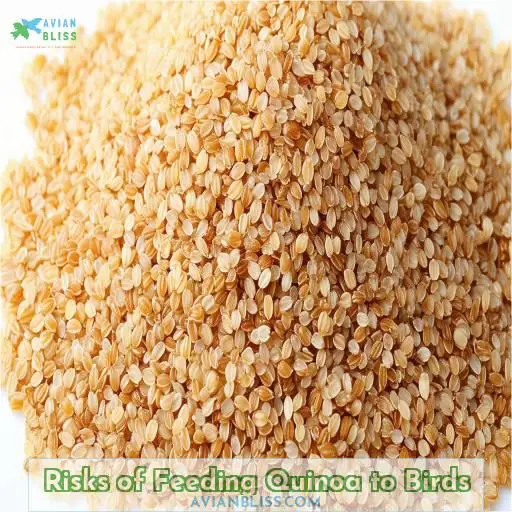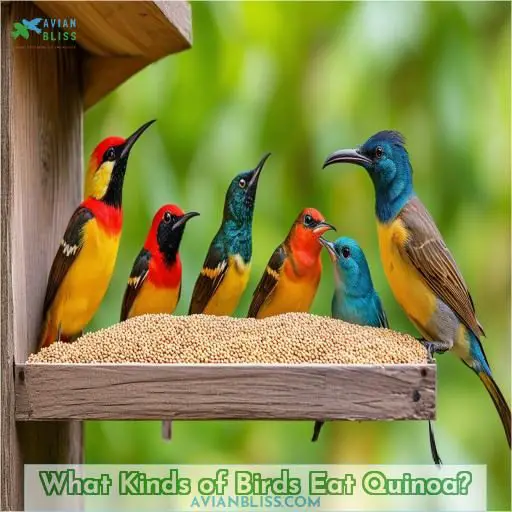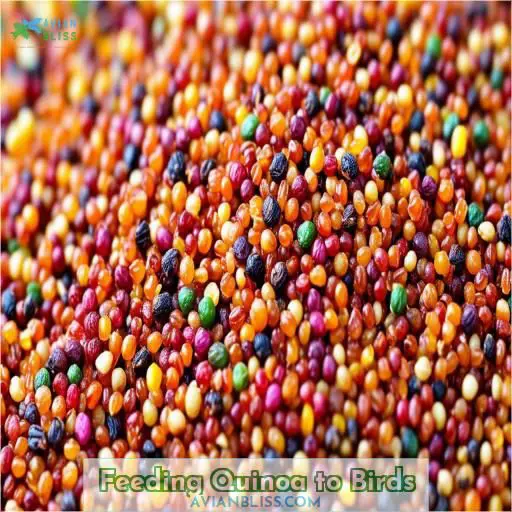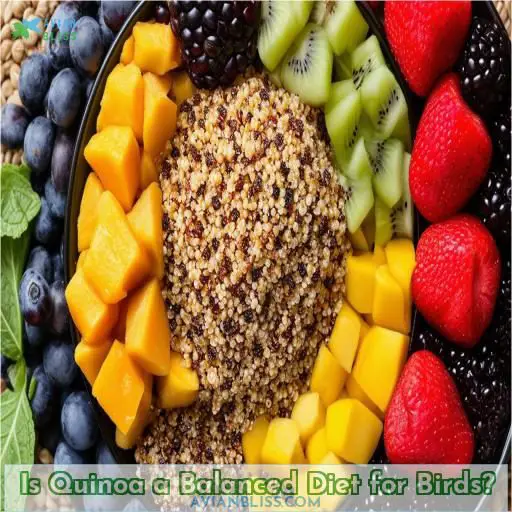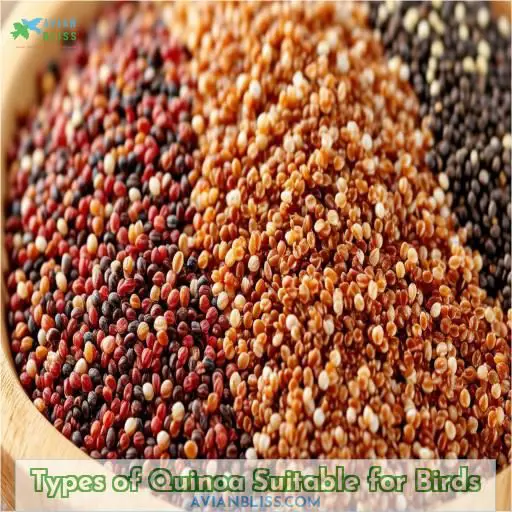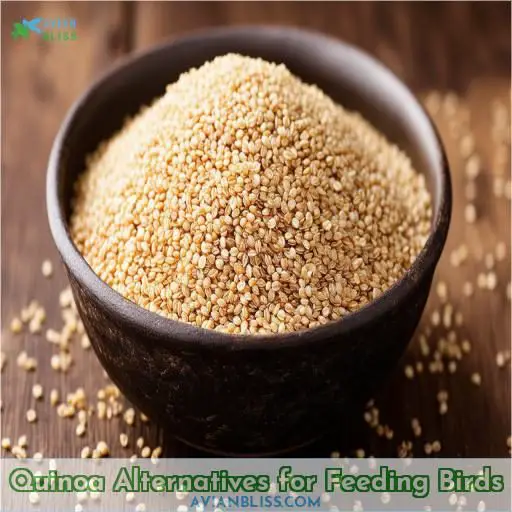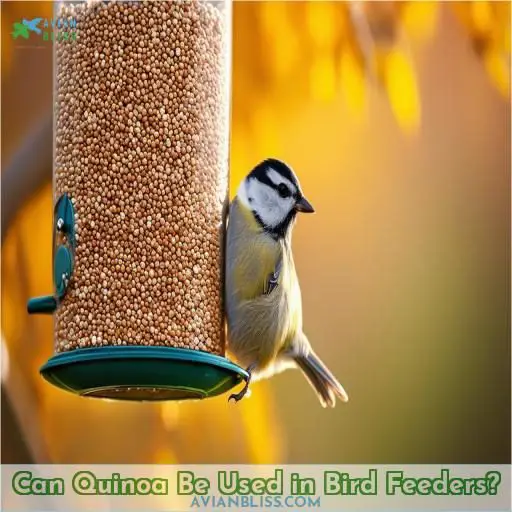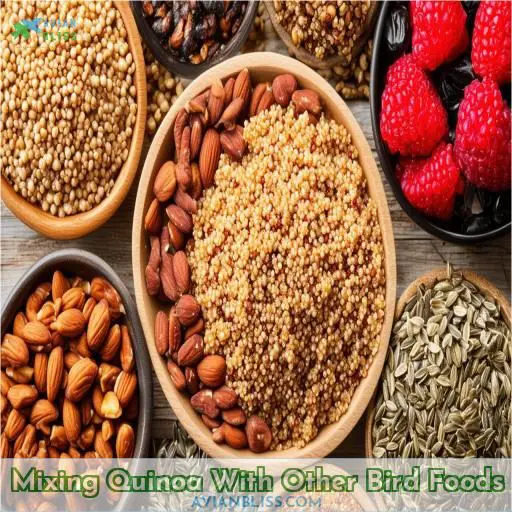This site is supported by our readers. We may earn a commission, at no cost to you, if you purchase through links.
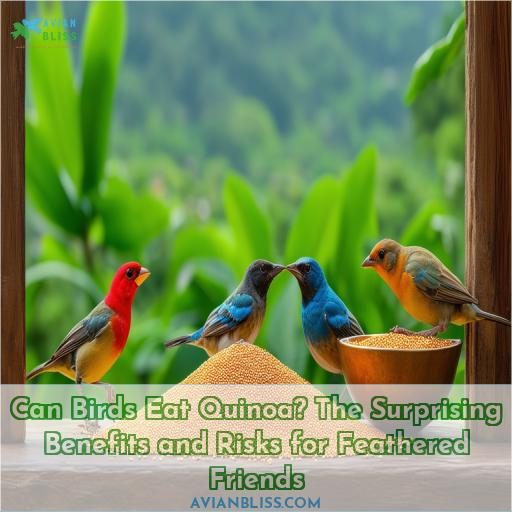
This nutrient-packed seed provides essential proteins, vitamins, and minerals that feathered friends need. However, you’ll want to remove the bitter saponin coating by thoroughly rinsing before serving.
Overfeeding quinoa can lead to digestive issues, so introduce it gradually as an occasional treat.
Sparrows, finches, doves, and other seed-lovers relish the nuttiness of cooked or raw quinoa. Scatter it on the ground, offer it in feeders, or mix into their regular fare – the possibilities take flight when you include this superfood.
Table Of Contents
- Key Takeaways
- Can Birds Eat Quinoa?
- Can Birds Eat Uncooked Quinoa?
- Nutritional Benefits of Quinoa for Birds
- Risks of Feeding Quinoa to Birds
- What Kinds of Birds Eat Quinoa?
- Feeding Quinoa to Birds
- Is Quinoa a Balanced Diet for Birds?
- Types of Quinoa Suitable for Birds
- Quinoa Alternatives for Feeding Birds
- Can Quinoa Be Used in Bird Feeders?
- Mixing Quinoa With Other Bird Foods
- Frequently Asked Questions (FAQs)
- Can I feed uncooked quinoa to birds?
- How to cook quinoa for birds?
- What grains can I feed birds?
- Which animal eats quinoa?
- Can birds eat quinoa every day?
- Is quinoa better than other grains for birds?
- How much quinoa should I feed my bird?
- Can quinoa cause digestive issues in birds?
- Is quinoa safe for baby birds to eat?
- Conclusion
Key Takeaways
- Quinoa is a nutrient powerhouse for our feathered friends, packing a protein punch and a whole host of essential vitamins and minerals that help keep their feathers healthy and their engines revving.
- Before serving up this superfood, be sure to give those little quinoa seeds a good rinse to remove their bitter saponin coating – otherwise, your birds might end up with a case of the rumblings in their tummy.
- While quinoa makes a great occasional treat, you don’t want to go overboard and make it the main event – variety is the spice of life (and a balanced diet) for our feathered pals.
- Whether you’re cooking up a quinoa feast or offering it raw, get creative with mixing in other bird-approved goodies like seeds, nuts, and fruits to really crank up the flavor and nutrition factor.
Can Birds Eat Quinoa?
Yes, birds can eat quinoa, but it must be prepared properly. Quinoa is a nutritious seed that provides protein, fiber, vitamins, and minerals for birds, but the natural saponin coating should be removed by rinsing or cooking before feeding it to birds to avoid digestive issues .
Can Birds Eat Uncooked Quinoa?
When considering uncooked quinoa for birds, it’s significant to note that raw, unflavored quinoa is safe and beneficial for our feathered friends.
Before serving, be sure to remove the natural saponin coating by rinsing the seeds thoroughly. This step is important to prevent any potential gastrointestinal effects.
Uncooked quinoa provides birds with essential proteins, minerals, and other nutrients, contributing to their overall nutrition.
You can incorporate uncooked quinoa in bird feeders or mix it with other bird foods to create a varied and balanced diet.
Nutritional Benefits of Quinoa for Birds
Quinoa is packed with protein, essential for building and repairing feathers and muscles. It also provides fiber to support healthy digestion, along with an array of vitamins, minerals, and beneficial omega-3 fatty acids that support overall avian health.
Protein
Quinoa’s protein quality, amino acid profile, and bioavailability make it ideal for protein synthesis and muscle development in birds. Its high protein content supports a healthy diet and overall well-being for feathered friends.
Fiber
Quinoa’s fiber content promotes healthy digestion and gastrointestinal function in birds. Its prebiotic and probiotic properties support gut microbiome balance. Fiber-rich foods like quinoa, wheat, brown rice, and millet are essential for avian health and wellbeing.
- Supports digestive health
- Promotes regular bowel movements
- Feeds beneficial gut bacteria
- Prevents constipation and diarrhea
- Enhances overall bird wellness
Vitamins and Minerals
Quinoa offers birds a variety of essential vitamins and minerals, including B6, riboflavin, copper, and potassium. Its saponin coating can be removed to enhance palatability. Additionally, Quinoa provides flavonoids, such as quercetin and kaempferol, contributing to its nutritional value for birds. (Source)
Omega-3 Fatty Acids
Quinoa’s omega-3 fatty acids are essential for birds, aiding in egg hatching, skin and fur health, and vitamin absorption . Offer cooked quinoa or mix it with maize for a nutritious, balanced meal that birds will love .
Risks of Feeding Quinoa to Birds
While quinoa offers valuable nutrients for birds, the uncooked seeds have a saponin coating that can irritate their digestive systems. You should properly prepare quinoa by rinsing or cooking it to remove this bitter, soapy coating before feeding it to feathered friends.
Saponin Coating
Quinoa naturally contains saponin, a bitter coating that deters birds from eating it. This evolved as a defense mechanism against bird consumption. To safely feed quinoa to birds, thoroughly rinse off the saponin coating. Organic quinoa may not require rinsing, as the saponin is often removed during processing.
Gastrointestinal Effects
Quinoa’s saponin coating can irritate birds’ sensitive digestive systems, potentially causing diarrhea, vomiting, and abdominal pain. Certain species may be more susceptible to these issues. Proper preparation, such as soaking and rinsing quinoa seeds, helps remove saponins and reduces the risk of gastrointestinal distress in feathered friends.
Preparing Quinoa to Remove Saponin
To safely feed quinoa to birds, soak the seeds for 24 hours, changing the water frequently. Blend the soaked quinoa with fresh water to remove any remaining saponin. Use a 1:3 quinoa to water ratio. Overfeeding quinoa may cause digestive issues due to saponin toxicity. Introduce it gradually as a treat in moderation.
What Kinds of Birds Eat Quinoa?
Many popular backyard birds like sparrows, finches, doves, robins, canaries, parakeets, cockatiels, and parrots have a taste for quinoa and can benefit from its nutrient profile. When introducing quinoa to your feathered friends, start with small portions to make sure they take to it before offering larger amounts.
Sparrows
Sparrows, like finches and doves, enjoy eating quinoa. Its availability, cultivation, and pricing make it a suitable and nutritious option. (Source)
Finches
Finches, like sparrows, relish quinoa. These seed-eating birds thrive on its protein and fiber. Finches’ beaks easily crack open quinoa seeds.
- Finches include house finches, purple finches, and American goldfinches.
- Quinoa provides essential nutrients for finches’ health and reproduction.
- Finches readily accept quinoa in feeders or scattered on the ground.
Doves
Doves, like other bird species, are known to enjoy quinoa, making it suitable for bird feeders and their nutritional requirements.
Robins
Robins relish quinoa, especially when mixed with their favorite foods like berries and worms. Offer quinoa in open feeders near nesting sites.
Canaries
Canaries can enjoy quinoa due to their seed preference and adaptability in wild diets, aided by their unique beak shape and digestive system.
- Seed preference
- Wild diet
- Beak shape (Source)
Parakeets
Parakeets, like finches, enjoy quinoa’s nutritional benefits. Offer cooked or sprouted quinoa, but avoid raw due to saponin risks. Monitor intake for a balanced diet.
| Health Benefits | Safety Precautions | Food Preferences |
|---|---|---|
| Protein | Remove saponin | Cooked quinoa |
| Vitamins | Limit intake | Sprouted quinoa |
Cockatiels
Cockatiels, like parakeets, can enjoy quinoa as part of a balanced diet, providing protein, fiber, and essential nutrients for cockatiel health .
Parrots
Parrots love organic quinoa, sprouted quinoa, and quinoa flakes. Offer as part of a balanced diet with wheat, rice, millet alternatives.
Feeding Quinoa to Birds
You can offer cooked quinoa to birds by boiling it until soft, then letting it cool completely. For raw quinoa, rinse it thoroughly to remove the bitter saponin coating before drying and serving it in a feeder or scattering it on the ground.
Cooked Quinoa
Cooked quinoa is a safe and nutritious treat for birds. Rinse quinoa thoroughly to remove saponins, then cook until soft. Let cool before serving. Offer cooked quinoa alongside your bird’s regular diet. Quinoa provides protein, fiber, vitamins, and minerals that support avian health. Experiment with different cooking methods to find your bird’s favorite preparation.
Raw Quinoa
Raw quinoa contains saponin, a natural coating that deters birds. Though saponin isn’t harmful to birds, it’s crucial to rinse uncooked quinoa thoroughly to remove this coating. Additionally, birds need to enjoy a small amount before offering more . Make sure to provide clean, organic quinoa to avoid potential toxins and consider sprouting as an alternative to remove saponin .
Serving Methods
To serve quinoa to birds, first soak uncooked seeds for an hour to remove the bitter saponin coating. Rinse thoroughly and let dry. Cooked quinoa is also safe – boil for 10-12 minutes until soft, let cool, and serve. Store leftovers in an airtight container. Offer quinoa as part of a varied diet in moderation.
Is Quinoa a Balanced Diet for Birds?
While quinoa provides excellent nourishment for birds, it shouldn’t be the exclusive component of their diet. Birds’ digestive systems require a diverse range of foods to function effectively. Quinoa can be a nutritious supplement, but it lacks the fiber, calcium, and other essential nutrients found in a balanced diet of seeds, grains, fruits, and vegetables. Cultivating quinoa isn’t a natural behavior for birds, and excessive consumption may impact egg production and shell quality. Moderation is crucial when incorporating quinoa into your feathered friends’ meals.
- Quinoa lacks essential nutrients for a complete bird diet
- Birds’ digestive systems require a diverse range of foods
- Quinoa should be fed in moderation as a supplement
Types of Quinoa Suitable for Birds
The most suitable types of quinoa for birds are organic, sprouted, and quinoa flakes. Organic quinoa lacks the saponin coating that can be toxic, sprouted quinoa maximizes nutrient availability, and quinoa flakes provide an easily digestible form of this nutrient-dense pseudograin.
Organic Quinoa
When considering feeding birds, opting for organic quinoa is advantageous. Unlike regular quinoa with a natural coating of saponin, organic quinoa lacks this potentially deterrent layer, making it safer for bird consumption. This removal of the coating minimizes the potential risks associated with saponin, ensuring a healthier dietary choice for your feathered friends.
Sprouted Quinoa
Sprouted quinoa offers a nutritious twist for your feathered friends. The germination process enhances bioavailability of nutrients. Sprout quinoa by soaking for 24 hours. Ideal conditions include:
- Warm temperature
- Darkness
- Moist environment
- Rinsing every 8-12 hours
Sprouted quinoa provides a healthy, easy-to-digest treat packed with vitamins, minerals, and protein to support your bird’s wellbeing.
Quinoa Flakes
Quinoa flakes are a convenient option for feeding birds. Pressed from whole grains, they provide protein, fiber, and omega-3s without requiring preparation. Simply sprinkle flakes over your feathered friends’ regular diet for a nutritious boost. Quinoa flakes are readily available and easy to incorporate into any bird’s menu.
Quinoa Alternatives for Feeding Birds
While quinoa offers nutritional benefits for birds, you may want to explore alternatives like wheat, brown rice, millet, and maize. These grains provide a balanced mix of protein, fiber, vitamins, and minerals suitable for a bird’s diet.
Wheat
Wheat is a nutritious alternative to quinoa for birds, providing protein, fiber, vitamins, and minerals. Its versatility makes it a great addition to any bird’s diet. Offer wheat in moderation as part of a balanced meal plan.
Brown Rice
Brown rice provides birds with a nutritious alternative to quinoa, boasting protein, fiber, B-vitamins, and minerals. Nonetheless, be cognizant of potential hazards such as arsenic contamination. Seek guidance from avian experts to ascertain appropriate quantities for various species and maintain a well-rounded diet.
Millet
Millet is a nutritious alternative to quinoa for birds. Its high fiber content aids digestion, while B-vitamins and minerals support overall health. Offer millet as part of a varied diet to provide essential nutrients in different forms. Explore millet’s many variations to keep meals interesting.
Maize
Maize, a versatile grain, offers birds:
- High protein and fiber content
- Essential vitamins and minerals
- Diverse cultivars for varied diets
- Pest-resistant varieties for safe consumption
Proper storage prevents spoilage, ensuring prime nutrition. Incorporate maize into your feathered friends’ balanced diet for a healthy, happy flock.
Can Quinoa Be Used in Bird Feeders?
Quinoa can be a great addition to your bird feeder, but it’s important to properly prepare and store it first. Thoroughly rinse quinoa to remove the saponin coating, which can cause gastrointestinal issues in birds. Dry the quinoa seeds completely before adding them to your feeder. Store quinoa in an airtight container in a cool, dry place. Quinoa is packed with protein, fiber, vitamins, and minerals that provide essential nutrients for your feathered friends. Offer quinoa as part of a balanced diet for ideal bird health and happiness.
| Quinoa Preparation | Quinoa Storage | Quinoa Nutrition |
|---|---|---|
| Rinse thoroughly | Airtight container | Protein |
| Remove saponin | Cool, dry place | Fiber |
| Dry completely | Vitamins | |
| Minerals |
Mixing Quinoa With Other Bird Foods
When mixing quinoa with other bird foods, consider their flavor preferences and nutritional balance.
Blend quinoa with seeds, nuts, and fruits to create varied, nutritious mixtures.
Use appropriate mixing ratios to guarantee birds receive the maximum nutritional benefits from the combination.
Pay attention to seasonal availability when selecting ingredients for the mixtures.
Properly balanced quinoa mixtures can provide birds with a diverse and appealing diet, promoting their health and well-being.
Keep precise records of the mixtures to adjust and fine-tune the recipes over time.
Frequently Asked Questions (FAQs)
Can I feed uncooked quinoa to birds?
You can feed uncooked quinoa to birds, but it’s best to rinse it thoroughly first to remove the saponin coating. This natural antinutrient can cause digestive issues for birds if ingested in large quantities. Offer only a small amount initially to make sure your feathered friends enjoy it.
How to cook quinoa for birds?
To cook quinoa for birds, rinse it well, then simmer in a pot with 2 parts water to 1 part quinoa until fluffy, about 15 minutes. Let it cool completely before serving.
What grains can I feed birds?
You can feed birds a variety of grains like millet, cracked corn, oats, and quinoa (rinsed to remove saponin). Mix different grains for a balanced diet.
Which animal eats quinoa?
You’d be surprised – birds actually enjoy munching on quinoa! This nutrient-rich pseudo-grain provides protein, fiber, and essential vitamins that benefit our feathered friends.
Can birds eat quinoa every day?
Yes, birds can eat quinoa daily as part of a balanced diet. It’s a nutritious seed high in protein, vitamins, and minerals that benefit feather health and growth.
Is quinoa better than other grains for birds?
Quinoa offers higher protein and nutrients compared to grains like wheat or corn. But you’ll need to vary your bird’s diet with other healthy grains for comprehensive nutrition.
How much quinoa should I feed my bird?
Start small, like a grain sandbox, scattering quinoa mixed with their regular seed. Once acclimated, offer a teaspoon or two daily, adjusting portions to prevent obesity.
Can quinoa cause digestive issues in birds?
Yes, quinoa can potentially cause digestive issues in birds if introduced too quickly or in large quantities. Start with small amounts and monitor your bird’s droppings for signs of digestive upset.
Is quinoa safe for baby birds to eat?
You should avoid feeding quinoa to baby birds. Their immature digestive systems may struggle with the grain’s fibrous outer coating, potentially causing discomfort or issues. Once fully fledged, quinoa can make a healthy, protein-rich treat in moderation.
Conclusion
By welcoming quinoa into your feathered friends’ diet, you’re offering a nutrient-rich treat packed with proteins, vitamins, and minerals.
Remember to rinse quinoa thoroughly and introduce it gradually to avoid digestive upsets.
While not a complete diet, quinoa provides variety for seed-loving birds like sparrows, finches, and doves.
With moderation and proper preparation, you can let your feathered companions enjoy the nuttiness of this superfood when feeding quinoa.

